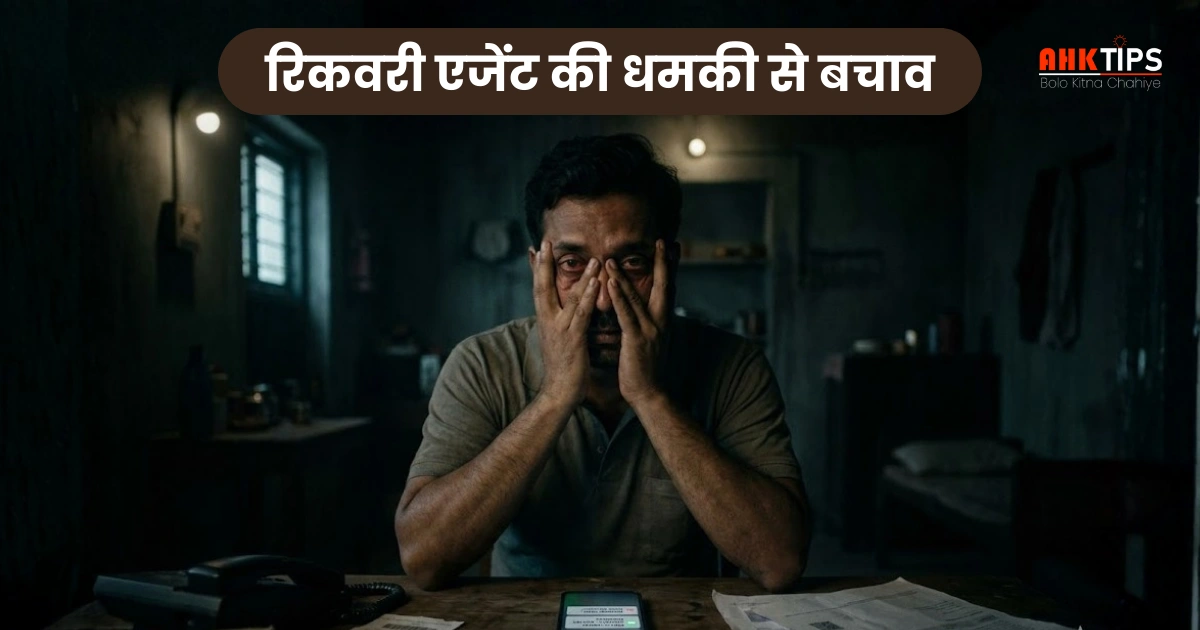





This article explains why protecting your financial and legal rights relies on a formal settlement agreement. It issues a caution against relying heavily on verbal agreements, as they can create credit difficulties and subsequent problems. The loan settlement tips help to learn guides readers through the contents of a valid settlement letter, such as loan details, agreed value, repayment terms, and confirmation of no further dues. It also touches upon how to avoid common mistakes, such as paying without written conditions or failing to update the credit bureau post-settlement and how to negotiate legally without a lawyer. ID, bank letters, and RBI guidelines are used to verify recovery agents, say borrowers. A final legal checklist ensures proper settlement closure with proper documents in place. This saves your credit score and prevents you from treading on legal hot ground.
Particularly if you are in debt, paying off a loan can be a wonderful sense of relief. To avoid problems down the line, however, it is important to do so properly. Many people unwittingly agree to a loan settlement tips orally or with improper documentation. This can lead to disputes, credit problems, or even lawsuits in the future. Having a written loan settlement agreement is, therefore, not only recommended but also a necessity. It clearly shows your approved payment amount, the date by which you have to pay, and ensures that no additional money is demanded in the future. Find out everything there is to know about loan settlement agreements, how to negotiate legally, steer clear of common pitfalls, verify recovery agents, and follow a final checklist to complete the loan safely and completely.
Dealing with debt and outstanding loans, paying off the debt with a bank could seem like relief. Many borrowers, meantime, mistake concluding the settlement orally or without appropriate documents. Not only is getting a formal agreement for debt settlement beneficial; it is absolutely necessary. It guards your credit report, shields you legally, and helps to avoid future conflicts.
A loan settlement agreement is a written statement sent by the bank following negotiations on a smaller ultimate payment for a loan default. This agreement notes the agreed-upon sum, the payment deadline, and a note declaring the loan will be closed upon completion.
It serves as formal documentation proving the bank took the lower sum and you are no more accountable for the outstanding balance.
Should the settlement be decided upon just over a phone call or email, and the bank then disputes the terms, you could have no evidence to support yourself. You run the danger of being requested to pay the outstanding sum once again or of ongoing recovery action without a documented agreement for loan settlement.
Based on what the lender reports, the credit bureau changes your credit standing. Should the settlement not be officially recorded, the debt could continue to show as past-due or owing. The only way to be sure your credit report shows the proper “settled” status is with a signed agreement.
To prevent uncertainty, the paper must to list your entire name, loan account number, and kind of loan. This guarantees that the agreement is related with the accurate loan record.
The settlement letter should make it abundantly evident the complete and final settlement sum that the bank has decided to accept. This guard, you should see the bank subsequently wants more for.
You want to specify the exact date you have to pay the bill. Missing this date will nullify the agreement, hence, the deadline should be reasonable and clear.
The letter should state that you will be free of more responsibility after the compensation is paid. This point is essential in shielding you from upcoming legal notifications or calls for collection.
When you get the formal settlement agreement, pay the precise amount by the specified date. Delay or underpay; this will invalidate the cases and cause new recovery actions.
Ask the bank for a No Dues Certificate or Payment Acknowledgement after paying. Save this alongside the original settlement letter. If the bank tries future collection or if your credit report contains mistakes, these records are vital.
Check your credit record a few weeks later to be sure the loan is listed as “closed,” or “settled.” Should mistakes arise, get in touch with the bank and forward the settled proof to the credit bureau for adjustment.
Settlement can be a sensible means of escape if you are having trouble paying back loans. Though many believe they require legal assistance, you can lawfully negotiate loan settlement on your own. Reaching a reasonable arrangement straight with the bank or lender is achievable with the correct strategy, planning, and paperwork.
The settlement of a loan is not a waiver. This is a negotiated agreement whereby the borrower closes the loan account with a smaller lump sum payment. Usually, this results from financial difficulty, job loss, medical issues, or other legitimate causes rendering payments impossible. To be ensure to that Loan settlement tips
Your credit record marks the debt as “settled” once the lender accepts the offer. While it could affect your credit score, this is not like “closed” and helps you prevent more legal or collection activities.
Check your debt, interest, penalties, and loan classification—that of a non-performance asset—before getting in touch with the bank. Evaluate also your lump-sum payment capability. Your negotiating plan is built upon this.
Get ready to clearly state your financial difficulty. To prove to the bank that your circumstances are real, keep paperwork such as income loss records, medical bills, or letters on job termination.
Ask to talk with someone managing loan settlements by contacting the correct department within the bank. Keep cool and courteous. Tell them straightforwardly about your circumstances and ask to meet or talk about a possible settlement on a call.
Say you want to complete the debt in good faith and are seeking to lawfully discuss loan settlement. Usually, good results follow from a polite and cooperative attitude.
An offer not a very low amount, the bank is unlikely to accept. Offer a reasonable sum depending on your loan size and the length of the late payment. Especially if the account is already labelled as bad debt, banks usually settle for a fraction of the outstanding amount.
Make sure the bank knows this is your best offer and you are ready to pay right away should the deal be accepted.
Once a verbal agreement is reached, ask the bank for a written settlement letter. This paperwork should include your name, loan account information, agreed amount, payment schedule, and a statement declaring the bank will not pursue additional recovery.
Never pay without this official confirmation. It provides your legal defence should future conflicts arise.
Ask for a receipt and a No Dues Certificate once the settlement is paid. Keep these records secure. They could be needed if the bank tries to collect once again or if your credit report is inaccurate.
After a few weeks, review your credit record to be sure the loan shows as “settled.” If not, ask the credit bureau for a repair and affix your documentation.
If you are having financial difficulties, paying off a loan to a bank could seem like your only choice. You do, however, have legal rights even in settlement talks. Knowing your borrower rights during loan settlement tips will help you steer clear of pressure strategies, misleading promises, and long-term financial harm.
Knowing these rights enables you to take charge and guarantees a legally safe and equitable settlement.
Guidelines established by authorities including the Reserve Bank of India bind banks and recovery agents. You are entitled to be treated honorably free from harassment.
Recovery agents are not permitted to use harsh language, visit your house or place of employment without warning, or threaten you. Should they do so, you can report a matter to the bank and forward it to the consumer forum or banking ombudsman.
Though they are not legally obliged to provide settlements, banks do take them into account in circumstances of actual hardship. You are not obliged to take the first offer the bank presents at the same time.
You are entitled to clarify your circumstances and suggest a reasonable sum. The bank has to take your request into account and cannot make you accept unfair terms on demand.
You also have the right to a clear settlement procedure. This covers knowing exactly how much you owe, how the final settlement figure was computed, and what will happen following payment.
Before making any payment, request a documented breakdown of dues and a written settlement offer.
Receiving a written agreement is among the most vital borrower rights during loan settlement. This paperwork legally guards you and attests to the bank’s approval to accept the lower payment as a whole and final payment. payment
The agreement should include:
You run the risk of having further recovery actions even after payment without this documented assurance.
When contacting debtors, banks and their representatives have to abide by rigorous policies. You have the right not to be contacted at strange hours or your place of employment without your prior permission.
Usually, business hours should be used for phone calls. Calls repeated or threatening violate your rights and should be reported to the lender and pertinent authorities.
The bank has to mark your loan as “settled” to credit bureaus after the settlement is paid. You are entitled to review your credit report and file a dispute should the status be inaccurately changed.
You can complaint the bank and send supporting documentation including the payment receipt and settlement letter. Should the problem not be fixed, you could seek straight correction from the credit bureau.
Especially in cases of financial pressure that becomes intolerable, settling a loan can be a useful approach to close an outstanding obligation. Many borrowers, meanwhile, unintentionally make legal mistakes during the procedure that could cause problems downthe road. Knowing the legal errors in debt settlement will enable you to stay safe and guarantee a just result.
Not having a documented settlement agreement from the bank is one of the major errors borrowers make. Informal communications or verbal agreements have no legal force.
You have no evidence of the settlement terms without this paper, hence the bank could legally pursue you for the outstanding balance.
Paying the agreed-upon sum, depending on a verbal discussion with a bank agentt is another typical mistake. Should the agreement not be recorded, the bank might not accept the settlement, and your payment could be regarded as a partial rather than a complete final close.
Before you pay anything, always get the settlement terms in writing. This guarantees the loan will be shown as “settled” in credit records and safeguards your legal rights.
You should get a No Dues Certificate or Final Settlement Letter right away if the settlement is paid. This certifies that you owe nothing more.
One of the typical legal errors in loan settlement tips skipping this stage, since it may cause credit report problems or collection calls downstream. Safely save any receipts, emails, and letters in case you have to contest any upcoming claims.
Should the lender misreport the status even after a successful settlement, your credit report could display the loan as current or past-due. Following settlement, always review your credit report.
Should the status be erroneous, dispute with the credit bureau, and send your payment evidence and settlement letter. Unresolved mistakes might compromise your future capacity for fresh credit.
Many borrowers interact with recovery representatives who guarantee speedy loan settlement for a cost. You run the danger of invalid agreements or fraud should these agents not be formally appointed by the bank.
Check the agent’s identification and authorisation before talking or making any payments. To be sure, ask for an official letter from the bank or call the branch. Share personal financial records with unreliable people not at all.
Dealing with debt settlement, borrowers frequently communicate with recovery agents. Although many agents work under appropriate authority, some act outside of their position or independently. Before making any payment or having any conversation, be sure that RBI RBI-approved recovery agency credentials are checked to prevent fraud or harassment.
Legal and financial protection comes from knowing how to spot a qualified recovery agency.
Recovery agents appointed by banks and NBFCs can reach borrowers and settle debt. On how these agents should behave, the Reserve Bank of India has published explicit rules, nonetheless. Agents either unverified or illegal could employ pressure strategies or falsify settlement terms.
Dealing with the wrong agent can result in false agreements, erroneous payments, or legal problems down the road.
Ask for a proper ID card always when an agent calls you. RBI rules mandate that agents carry an identity that unequivocally shows:
You are entitled to get a formal letter from the bank declaring the agent authorised to handle your account. This letter ought to include your name, loan account number, and agent’s information.
To confirm the appointment, directly get in touch with your bank using the customer service number or email. Do not base all of your decisions on what the agent advises.
Usually registered and following the Code of Conduct set down by the Indian Banks’ Association (IBA) or RBI-approved standards, banks use recovery services.
Ask the agent which company they represent, then research that agency online. It’s encouraging if the agency appears on the bank’s website or official documents. For public use, many banks also provide lists of empanelled recovery companies.
If you observe any of these actions, cease the contact right away and notify your bank.
An agent asking for direct cash payments or access to your bank account or personal loan settlement apps raises serious questions. RBI rules insist that all payments go straight to the bank rather than to any one agent.
For every arrangement or payment you make, insist always on formal confirmation letters and bank receipts.
If your loan settlement is almost at an end, you should finish a correct legal checklist for loan settlement tips. This guarantees that you safeguard your credit, avoid future conflicts, and permanently close the problem.
Go over the settlement letter closely before making the last payment. Check the following:
Should the loan be joint, ensure sure the final settlement agreement specifies both borrowers. Should only one party be named, the other could still be accountable subsequently.
Ask the bank for a No-Dues Certificate always, once the payment is paid. This paperwork shows the loan has been paid off; there is no more payment required. In case any future claims develop, this is your legal evidence.
A few weeks after the settlement closes, review your credit record. Make sure the loan status is shown as “settled” rather than “active” or “defaulted.” Should mistakes exist, dispute them with the credit bureau.
Safely retain the following records:
Should future conflicts arise, these papers act as official evidence.
Following this legal checklist for loan settlement helps you avoid legal and financial hazards down the road.
Settling a loan helps you pay off your loan, and the loan settlement tips it has to be done in a safe manner and legally. Always try to acquire a written settlement agreement from the bank to avoid future hassles. Ensure the agreement mentions the loan details, the payment to be made, and that you owe nothing more after payment. Never accept verbal agreements and pay without proper documentation. Maintain possession of the documents, including the No Dues Certificate, to confirm the loan is settled. Verify the credit report post-settlement to ensure the status is updated accordingly. Be careful with recovery agents as well—always confirm their identity and authorisation. Follow these steps with the legal checklist to complete your loan settlement tips safely, avoid confusion, and secure a safe financial future.
Que: Why is a written loan settlement agreement important?
Showing the negotiated settlement amount, payment schedule, and loan closure, which legally protects you, a written agreement helps to correct your credit report and helps to keep upcoming disputes under control.
Que: Can I rely on a verbal settlement with the bank?
Verbal agreements are risky since they lack any legal evidence. Should a written agreement not exist, the bank can insist on further funds or continue with recovery programs.
Que: What should I do after paying the settlement amount?
Always pick up a No Dues Certificate from the bank and keep all payment receipts. Also make sure the loan shows as “settled,” by looking over your credit report.
Que: How can I verify if a recovery agent is authorised
Together with a bank authorisation letter, ask the agent for appropriate ID. Directly contacting your bank will also enable you to further confirm their validity.
Previous Post
